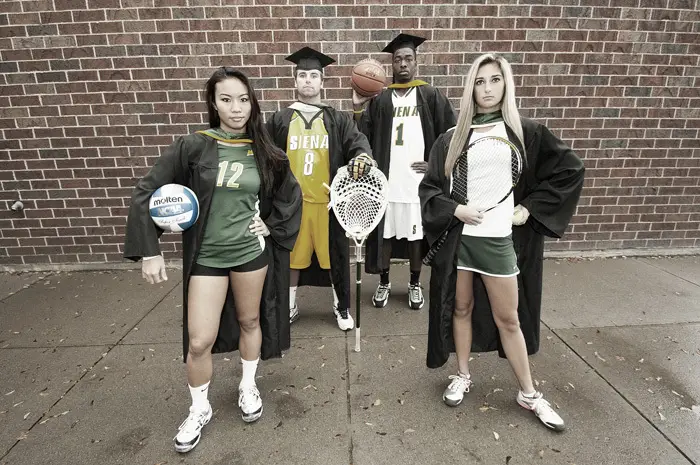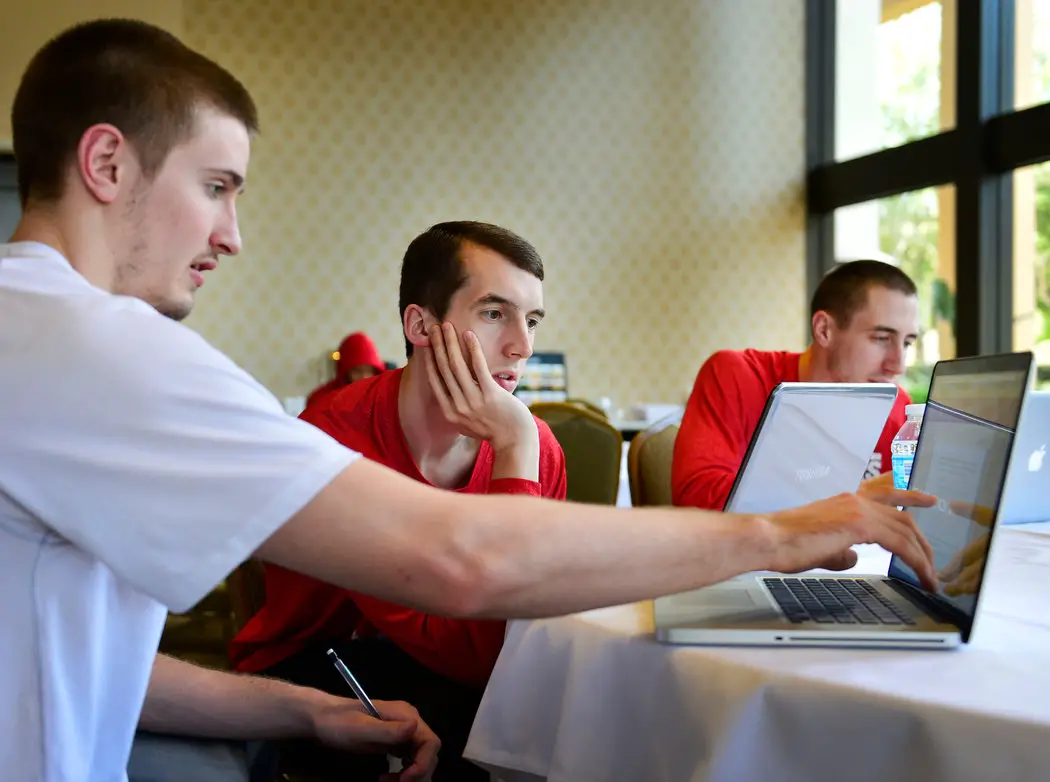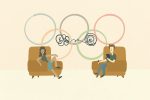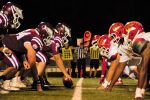I love to bake sugar cookies.
Sure, I like to eat them too, but I really just love to take that cool, refrigerated dough and roll it out before cutting it into trays and trays of fun symmetrical shapes. Stars, rubber duckies, Christmas trees, volleyballs, basketballs, doghouses, Easter eggs—I love them all. When I make cookies, the shapes each have a little piece of me in them. I make rubber duckies because they’re cute and I love the color of the cookie cutter (a cheerful aquamarine plastic). I make doghouses because I love my puppy; I make volleyballs because I played the sport for nine years. I choose the cookie cutters based on my interests.
Many of those cookie cutters are sports themed. I have a circle that can be a soccer ball, a baseball, a volleyball or a basketball. I have cookie cutters in the shape of a baseball bat, a whistle, a referee shirt, a winged track shoe, a tennis racket and even a pair of swim goggles. Because I was an athlete, my cousins once gave me a bag of sports-themed cookie cutters for my birthday. And I love them. But as much as I enjoy my sports, they are not the only thing that defines me.

College athletes are used to being stereotyped and defined by their identities as athletes. Professors, faculty and peers tend to have certain prejudices regarding student athletes, and they are usually not positive. More importantly, they are usually inaccurate. Regardless of their truth, however, these perceptions impact the lives of student athletes every day, and can only be broken once they have been acknowledged.
Like all stereotypes, those surrounding college athletes are founded in truth. There will always be people who fit their stereotypes perfectly. With that in mind, the actions and attitudes of a few people are not a good indicator of an entire group. When asked about student-athlete stereotypes, a group of athletes at the 2017 NCAA Division III Track and Field National Championships came up with the following list, and then proceeded to express their complete and utter irritation at the people who (mistakenly) believe each and every stereotype.
1. Student-athletes are dumb.
This is probably the most commonly voiced misperception among student athletes. It both stems from and feeds into many of the other stereotypes, and is widely believed despite the fact that it is also the most thoroughly disproven.
Studies have shown time and time again that it is simply not true. College athletes have consistently higher graduation rates than non-athletes. The dedication and work ethic that it takes to be a college athlete tends to translate into the classroom, resulting in hard working and successful students.
2. Student athletes have other people to do their homework for them.
To be clear, yes many student athletes work with tutors on a regular basis. Athlete tutors can be found at nearly every school in one form or another, but it’s not because athletes are dumb or because they aren’t held to the same requirements as other students. Athletes miss class on a regular basis for games and competitions, and it’s not as fun and easy as it seems. Yes, students everywhere joke about skipping class, but those who actually skip all their classes tend to fail. Athletes don’t have a choice regarding which classes they have to miss, and they have to learn all the missed content anyway.
Take, for example, a completely non-scientific yet strangely accurate analogy. Imagine a bee who is required to bring a certain amount of nectar into the hive each day. This bee must bring in its nectar or it will be punished by the other bees for not doing its part. Each morning, the bees all go out together and find the best collection spot, retrieve their nectar and then bring it back to the hive. Now imagine a bee who is given the chance to look after the queen bee every morning. It is a privilege and an honor to look after the queen, but this worker bee must still do its part in collecting nectar for the hive. The bee isn’t around to find the nectar collection grounds in the morning, so after he is done with the queen, he has a helper who shows him where he can collect his nectar. He then does the same work as all the other worker bees in addition to his morning duties to the queen bee.
Like this bee looking after its queen, student athletes have the privilege and honor of representing their schools in their respective sports, but they must also do the same school work as the other students in order to pass their classes. Their tutors, like the bee’s helper, show these athletes what they missed while they were away competing, so that they can have the tools to do their work once they return to campus. The helper bee isn’t collecting nectar for the worker bee; it’s simply giving the worker the information to do its work. Similarly, the tutor isn’t doing the athlete’s work but simply passing on vital information the student missed while representing his or her school.
3. Rules don’t apply to student athletes.
While it is true that athletes are held to different standards than most students, those standards are actually considerably higher. Student athletes are often the public figures of their universities. They are the ones who are on university billboards and flyers and websites. The stereotype that rules don’t apply to these sportspeople stems from the fact that athletes are regularly in the media for making poor decisions, but the fact is that many non-athlete students make those same mistakes.

The difference is that the athletes are called on their mistakes—as they should be. They are the faces of their universities, and as such need to be held to higher standards. Even very good athletes do not make good promotional figures if they are regularly caught partying or trashing their opponents on social media. The rules still apply to student athletes, and the consequences for breaking those rules are often harsher than they are for non-athletes due to the athletes’ positions as the public faces of their schools.
4. Student athletes are all extroverts
Because student athletes are the public faces of their schools, it’s easy to believe that they are all extroverted—that they thrive on interactions and friends and parties. Typically, people who students recognize but don’t really know are incredibly outgoing. They probably became acquainted with the entire school via a friend of a friend of a friend while hanging out in the campus center at some point.
Athletes, however, are recognizable because they are on promotional material, social media feeds and campus papers and posters. That doesn’t necessarily make them outgoing, just recognizable. Many student athletes are extroverted, but many are not. Being an athlete doesn’t change that.
5. Student-athletes don’t need to get good grades, because their school is already paid for.
Only 2 percent of student athletes receive athletic scholarships of any sort, and less than 1 percent receive full rides to Division I schools. The majority of student athletes are simply competing because they love the sports and want to make the most of their opportunities to represent their schools.
NCAA Division III schools are not even allowed to offer athletic scholarships, regardless of the talent of the athletes. Being an athlete doesn’t guarantee a financially worry-free college experience, and many athletes’ scholarships are combinations of athletic and academic packages, both of which generally include GPA requirements. Grades are important for student athletes, just as they are for other students on any form of scholarship.
6. Student-athletes are all planning to incorporate sports into their future careers
“What’s your major?”
“Media communications.”
“And you’re an athlete?”
“Yep.”
“So you want to be a sportscaster! That’s cool!”
“No, I want to market foreign films.”
“Oh… seriously?”
“Yeah. I think it’s super interesting!”
“Huh. Okay…”
Just to get this out there—not all student athletes have sports in their futures. Some athletes want to be biologists or novelists, financial advisors, engineers or even dental hygienists. Sure, some want to be athletic trainers and coaches and nutritionists, but not every athlete falls into that category.
A lot of athletes will end up coaching someday, but it might just be a little league team or recreational soccer. Student athletes go on to real-world lives and careers after graduation just like all other students, and they may or may not choose to pursue an athletically oriented profession. If every college athlete pursued a sports career, there would be a pathetic lack of professional variety in the world.
When I bake my sugar cookies, I don’t only use my sports cookie cutters. Though I love those whistle cookies and swim-goggle cookies, sports are not the only things that define me; they are not the only cookies I want to bake. I also love my doghouse cookie cutter and my rubber duck cookie cutter and my Easter egg cookie cutter, because each of those represents me as well. So many student athletes spend their college lives trying to prove to their professors and peers that they are more than just “dumb athletes.” They care about their grades and their future careers, and they put in thousands of extra hours each year in order to represent their schools in the arena of competition.
Stereotypes are always grounded in some sort of truth, and it is true that there are certainly athletes and athletic programs that bend to these six perceptions, but most do not. Sugar cookies, if they are made well, all come out of the oven looking exactly alike. The cookie cutters make the same shape over and over again, so that one mold can make an entire batch of identical cookies. Athletes, though, are not sugar cookies. They don’t come from the same mold and they don’t all bake the same way for the same amount of time. Every athlete is different, with an individual background and future, so while a cool bag of sports-themed cookie cutters may be a great birthday gift for a niece or nephew, it might be worth asking if a safari-themed cookie cutter bag would be equally cool.

















